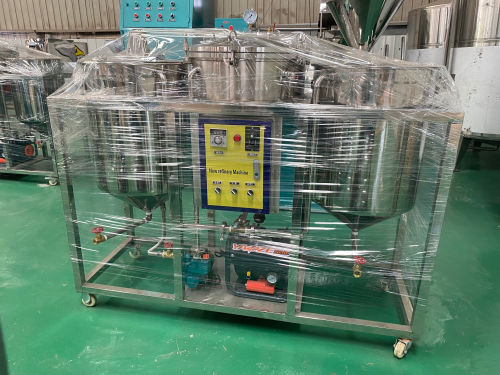
Small edible oil refining machines are devices that can process various kinds of crude vegetable oils, such as soybean oil, peanut oil, rapeseed oil, sunflower oil, etc., into refined oils that meet the standards of edible oil quality. Small edible oil refining machines have many advantages, such as low investment, easy operation, small footprint, and high efficiency.
There are different types of small edible oil refining machines, such as batch type, semi-continuous type, and continuous type. Each type has its own features and applications. For example, batch type refining machines are suitable for small-scale or intermittent production, while continuous type refining machines are designed for large-scale or continuous production. Semi-continuous type refining machines are a compromise between the two types, combining the advantages of both.
The basic working principle of small edible oil refining machines is similar: the crude oil is heated and degummed to remove the phospholipids and other impurities, then neutralized with alkali to remove the free fatty acids, then bleached with clay to remove the pigments, and finally deodorized with steam to remove the odors and volatile substances. The refined oil is then filtered and cooled to obtain the final product.
Small edible oil refining machines require regular maintenance and cleaning to ensure their optimal performance and durability. Some common maintenance tasks include checking the oil temperature, pressure, and flow, replacing the filter cloth and activated clay, cleaning the pipes and tanks, and lubricating the moving parts.
Small edible oil refining machines are widely used in various fields and industries, such as food, cooking, cosmetics, pharmaceuticals, and biofuels. Edible oil is an essential ingredient for human health and nutrition, as it provides energy, essential fatty acids, and fat-soluble vitamins. Edible oil also has many applications in other products, such as soap, detergent, lubricant, biodiesel, and more.